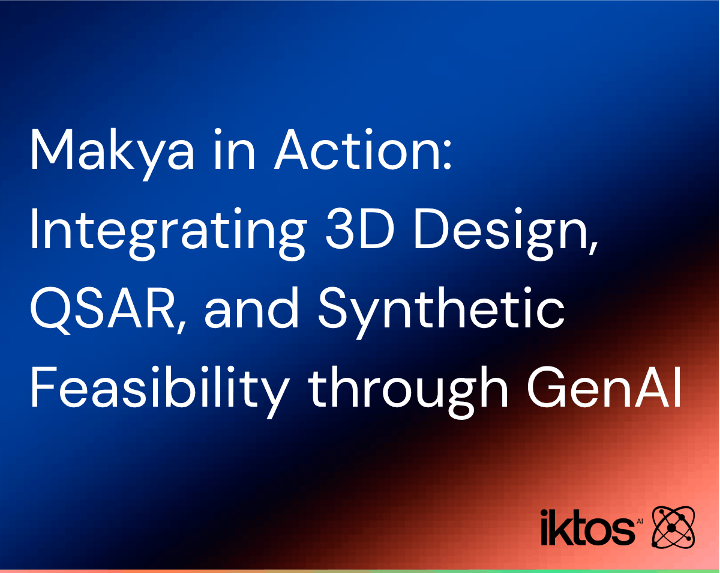Register here:
3 sessions, 40 mins each:
Dates: Nov. 6th, Nov. 20th and Dec. 4th 2025.
Time Europe/APAC: 10:00 CET / 17:00 JST: Registration link
Time Americas/Europe: 8:00 PST / 11:00 EST / 17:00 CET: Registration link
Agenda Highlights
Join us for a three-part webinar series exploring how Makya, Iktos’s synthetically-aware GenAI platform, empowers chemists to go from molecular ideation to synthesis-ready candidates. Designed for both current users looking to refine their skills and newcomers eager to see GenAI for discovery in action, this series blends practical learning with live demonstrations through valuable case studies. Each session features an interesting use case highlighting how Makya integrates 3D structure-based design, multiparametric optimization, and synthetic feasibility assessment to accelerate drug design and improve decision-making.
Session 1 — Nov 6th:
End-to-End Design Targeting GLP-1R: From De Novo Ideation to Synthetic Planning
Follow the complete journey of a GLP-1 receptor design project in Makya, from de novo ligand redesign using 3D structure-based methods to multiparametric optimization (MPO) and synthetic feasibility assessment. This session demonstrates how Makya’s integrated approach enables scientists to go from concept to synthesizable molecules efficiently, accelerating the transition from in silico design to the lab.
Session 2 — Nov 20th:
TYK2 Optimization: Blending QSAR, Generic Models, and 3D Insights
Discover how QSAR, ADMET, and 3D structure-based methods can be orchestrated within Makya to drive fast and balanced optimization of TYK2 inhibitors. This use case illustrates how to apply and weight different modeling strategies effectively, improving both design quality and project velocity.
Session 3 — Dec 4th:
Molecular Rediscovery: Validating AI Design on the C1s Target
Can Makya re-discover known inhibitors? In this validation use case, we challenge the platform’s 3D structure-based generative models to explore the chemical space of the complement C1s enzyme. Learn how Makya converges on known actives, what this reveals about the reliability of AI-generated designs, and how such analyses help scientists gain confidence in de novo design outcomes.
Speaker

Stefani Gamboa
Application Scientist, Iktos
Stefani Gamboa is a pharmaceutical and computational chemist by training. She holds a degree in Pharmaceutical Chemistry and a PhD in theoretical and bioinorganic chemistry, with a focus on quantum bioinorganic systems. Her doctoral research centered on the experimental design and theoretical modeling of polynuclear copper complexes, serving as bioinspired models for copper-containing enzymes with applications in catalysis and magnetic materials. Stefani gained industry experience at GlaxoSmithKline before moving into her current role as an Application Scientist at Iktos, where she works at the intersection of drug discovery, generative AI, and computational chemistry.



